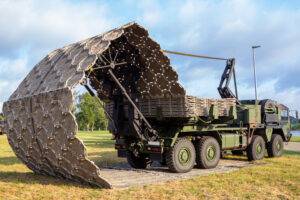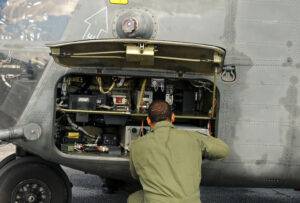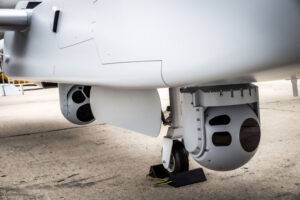
The appearance of U.S. Department of Defense (DoD) visual information does not imply or constitute DoD endorsement.
People tend to think of the military in terms of its contributions to, let’s say, a certain level of deconstruction. But American warriors are also builders. Bridges go up over impassable rivers; schoolhouses are built in remote villages. Airbases spring up in days in the middle of nowhere, and supply routes are established between remote outposts in deserts, jungles, and swamps.
These extreme feats are a testament to the capabilities of modern engineering. In fact, many advances in engineering disciplines over the years have been driven by military needs.
Ultimately, military and civilian engineers rely on the same basic principles and techniques. That makes engineering fields the perfect fit for military veterans who may have had some related training and practical experience. That kind of background helps, but even without it, the only thing between you and a civilian engineering job is finding a military friendly university that offers degrees in the engineering field you’re interested in.
Explore Your Military Training and Degree Options
Military and Civilian Engineering Share a Common Past
Engineering falls into four main fields:
Civil
Civil engineering handles the design, construction, and maintenance of structures. Everything from dams to skyscrapers to highway construction falls into this category, but so do entirely new specializations like environmental and geotechnical engineering.
Mechanical
Mechanical engineers do everything from designing and optimizing jet engines to developing advanced industrial manufacturing processes. This field also includes vehicle design specialties, such as automotive and aeronautical engineering.
Chemical
Chemical engineering deals with the physical process of converting raw materials into other products, or dealing with the properties of materials used in production or construction processes. This can include such exciting areas as molecular and bio-molecular engineering, or chemical manufacturing.
Electrical
Electrical engineering deals with power delivery systems as well as low-voltage systems design and building—think computer chips, cell phones, and software systems.
Military engineering is often considered to be a separate category from civil, mechanical, chemical, and electrical engineering, though it incorporates all of them.
There are dozens, if not hundreds, of specializations within these broader categories, however. As the world has become more complex, engineering skills have become more specific.
The American military has not only kept up with those trends, but in many cases forged ahead of civilian practices. When jobs need to be done under fire, soldiers get pretty creative.
That means a stint in the military can lay the practical groundwork for a college degree in a high-demand field.
Military Engineering Skills Delivered Some of the First American Battlefield Victories
 A Boston bookseller was the unlikely first hero of American military engineering. When the British occupied the city in the wake of the first battles of the Revolutionary War in nearby Lexington and Concord, young Henry Knox snuck out through the lines to join the militia besieging the city. Knox hadn’t had any formal military training, but he’d read plenty, and had a knack for putting together fortifications.
A Boston bookseller was the unlikely first hero of American military engineering. When the British occupied the city in the wake of the first battles of the Revolutionary War in nearby Lexington and Concord, young Henry Knox snuck out through the lines to join the militia besieging the city. Knox hadn’t had any formal military training, but he’d read plenty, and had a knack for putting together fortifications.
His skill brought him to the attention of General George Washington, who was at an impasse: though he had the British bottled up, he had no heavy artillery with which to evict them from the city. And redcoat reinforcements were surely on the way.
But Knox had an idea. Early in the war, other American forces had attacked and taken the British Fort Ticonderoga in upstate New York. It had been heavily fortified with almost 60 cannons and mortars. It was also some 300 miles from Boston, across trackless wilderness. And winter was coming.
On December 1st, Washington dispatched Knox with one mission: bring some 60 tons of artillery through snow, trees, and over frozen lakes to Boston before British reinforcements arrived in the spring.
Putting together oxen-driven sleds, improvised barges, and boats, Knox lead what became known as the noble train of artillery to positions on Dorchester Heights in just 40 days. Cannon fell through ice and had to be retrieved; boats sank and had to be re-floated. Knox and his men poured water over thin ice to thicken it enough to take the weight. They blazed trails though the wilderness and packed down snow for the oxen.
By March 2nd, the cannon were firing on British positions. And by March 17th, the British Army was put to sea and Boston was liberated… thanks to Henry Knox and his engineering skills.
What is Combat Engineering?
One of the unique aspects of military engineering is combat engineering.
Combat engineering is the application of engineering concepts and principles to shape the physical environment for advantage during combat operations.
Combat engineering incorporates elements of all of the different general engineering specialties. Military engineers have to deal with difficulties on the battlefield to tackle any sort of obstacle or meet any kind of need, from decontamination to bridging to building base housing. So a military engineering background offers a lead in to almost any sort of civilian engineering career.
Training for Military Engineers Lays the Foundations for a Degree in Engineering
 Engineering is so important to military operations that it was one of the first types of formal training that the fledgling Continental Army instituted.
Engineering is so important to military operations that it was one of the first types of formal training that the fledgling Continental Army instituted.
Engineers who join the military receive more in-depth technical training than you’ll find in almost any other military occupational specialty (MOS).
Today, every branch of the American military produces well-trained engineers. In fact, many of them go through exactly the same training facility, regardless of branch: the U.S. Army Engineer School at Fort Leonard Wood, Missouri.
USAES goes way back in the annals of American military history. Established in 1778 at Valley Forge, its first task was to develop essential knowledge of bridging, fortification, and siege works among the ranks of the Continental Army. One of the first tasks of the initial graduating class was developing the fortifications at West Point, New York. That was the beginning of a continuous military presence at that post which eventually became the United States Military Academy.
Nearly 250 years later, it continues to train up members of the American military in core engineering duties as diverse as geospatial engineering, construction, and topography.
Every Branch Has a Different Emphasis for Engineer Training
 Air, land, sea, space… every environment in which the modern American military operates has different challenges to overcome. And that means each branch has different engineering needs and training programs.
Air, land, sea, space… every environment in which the modern American military operates has different challenges to overcome. And that means each branch has different engineering needs and training programs.
For Army soldiers, engineering is one of the specialties that is eligible for One Station Unit Training. OSUT allows soldiers enlisted in certain Military Occupational Specialties to complete both their basic military training and their advanced individual training in a single, longer assignment at one base. This offers less disruption and better continuity of instruction.
Army Engineers
Army engineers fall into the MOS 12 series, covering such specialized positions as 12N, Horizontal Construction Engineers and 12Y Geotechnical Engineers.
Military and Civil Engineering Are Both Roles Filled by American Army Engineers
 The United States is unusual in that the military is specifically separated from many kinds of public roles within the country. The founders were worried about the influence of a professional standing army and kept it out of many civic responsibilities common elsewhere.
The United States is unusual in that the military is specifically separated from many kinds of public roles within the country. The founders were worried about the influence of a professional standing army and kept it out of many civic responsibilities common elsewhere.
But a big exception throughout American history has been the U.S. Army Corps of Engineers.
USACE is a unit that dates back to 1775 and has a unique dual role: it trains and oversees combat engineer formations in the active duty Army, but it also engages in enormous public works projects across the country.
The Corps has spearheaded big projects like the building of the Washington Monument, digging the Panama Canal, and creation of the Tennessee-Tombigbee waterway. It manages dams providing almost a quarter of all American hydropower, and is responsible for dredging and maintaining many of the country’s deep-water ports.
The Corps is also a big mover in environmental cleanup, having been tasked with the Everglades Restoration Plan in 1948 and tackling tough Superfund toxic waste sites since the 1970s. It is responsible for critical flood protection across the country.
The Navy runs a similar Civil Engineer Corps with a smaller scope. It maintains Camp David, the official presidential retreat, and a number of other government installations.
What this means is that even as a member of the military, you may be able to participate in big civilian engineering projects. You will gain valuable experience and help out with public works that contribute to safety and welfare more directly and on a daily basis than any other service member.
Air Force
 Airmen in the 3E5X1 AFSC (Air Force Specialty Code, their version of an MOS), engineer technical training consists of 71 days at USAES after completing basic military training. The Air Force also has a number of officer-level AFSCs such as Civil Engineers, Flight Engineers, and Developmental Engineers.
Airmen in the 3E5X1 AFSC (Air Force Specialty Code, their version of an MOS), engineer technical training consists of 71 days at USAES after completing basic military training. The Air Force also has a number of officer-level AFSCs such as Civil Engineers, Flight Engineers, and Developmental Engineers.
Air Force Flight Engineers are rated for flight duty. It’s a role that can put you in the air for the duration of your service as you monitor and manage aircraft systems, bombers, and transport planes as part of the flight crew.
Space Force
Space Force has significant engineering needs, but there are no enlisted engineering specialties in the service. Officers may become Developmental Engineers, with the same 62E rating as Air Force developmental engineers, with a training pipeline that includes a bachelor’s degree in a related field, a master’s degree or 24 months of comparable experience, attendance at Defense Acquisition University, and completion of the Air Force Flight Test Engineers Course.
Marine Corps
Marine Corps engineers primarily belong in the MOS fields of 13 (Engineer, Construction, Facilities, & Equipment) or 11 (Utilities). Some of these, such as 1371 combat engineers and 1141 electricians, are trained at Camp Lejeune with the Marine Corps Engineer School (MCES). More technically-oriented MOS such as the 1361 engineer assistant are sent to USAES however.
Navy
 For the Navy, engineering as a profession takes on a whole different level of emphasis from other services. Every Navy ship has a dedicated engineering department on board. Without them, absolutely nothing functions. Propulsion, lighting, weapons systems—even oxygen generation on board submarines—are all absolutely critical parts of every vessel.
For the Navy, engineering as a profession takes on a whole different level of emphasis from other services. Every Navy ship has a dedicated engineering department on board. Without them, absolutely nothing functions. Propulsion, lighting, weapons systems—even oxygen generation on board submarines—are all absolutely critical parts of every vessel.
That means Navy engineering education is a part of many different ratings, including
- Damage controlman
- Electrician’s mate
- Engineman
- Gas Turbine System Technician
- Hull Maintenance Technician
- Interior communications electrician
- Machinist’s mate
These all have different “A” schools with very specific courses of instruction that you will attend after basic training.
But there is also a whole group of Navy construction ratings that embrace some of the most traditional civil engineering roles. These are the famed Seabees (a name evolved from the abbreviation CB, for Construction Battalion), with ratings such as:
- Builder
- Construction electrician
- Engineering aide
- Utilitiesman
These ratings each have their own training pipelines, either attending a Navy “A” school in Gulfport, Mississippi, or with the Army at Fort Leonard Wood or the Air Force at Sheppard Air Force Base in Texas. They spend between 13 and 20 weeks in training depending on their specialty.
For Coast Guardsmen and Navy sailors, a substantial part of even basic intake training will cover various mechanical, fluid, and electrical engineering subjects. Knowing essential engineering principles could be critical to the safety of everyone on board a ship.
The Coast Guard obviously has similar needs and equipment to work with as the blue-water Navy, so they also have a variety of ratings in the Engineering and Hull group that cover most engineering specialties.
The Military May Help You Pay for an Engineering Degree Even Before You Join Up
 A select few officers can even get the military to help pay for a college education in engineering before joining up. Engineering is a preferred major for Air Force and Naval ROTC program scholarship awards. And while the Army doesn’t restrict you degree programs, they don’t turn up their noses at candidates who pick engineering.
A select few officers can even get the military to help pay for a college education in engineering before joining up. Engineering is a preferred major for Air Force and Naval ROTC program scholarship awards. And while the Army doesn’t restrict you degree programs, they don’t turn up their noses at candidates who pick engineering.
Engineers are in such demand that you can also find special programs designed to incentivize you to get your degree before you join up. The Navy, for example, offers the Civil Engineering Corps Collegiate Program, which offers pay and benefits to support you through the completion of an engineering degree program while guaranteeing a commission on graduation. The Air Force’s Technical Degree Sponsorship Program is similar. You can find a lot of these branch-specific benefits available in engineering if you look around.
And it’s also worth noting that all four service academies offer degrees in engineering. That’s a full ride scholarship plus military pay and benefits all through training.
The United States Military Academy at West Point was the first formal college of engineering in the country.
Getting in the groundwork of a bachelor’s degree before you are even commissioned opens the door to a lot of interesting jobs in the military. It also positions you to jump on opportunities to get an advanced degree on Uncle Sam’s tab while you are still on active duty.
Ongoing Training in Engineering Can Get You Part Way to a College Degree During Your Time In Service
 Once you are in the service, there are plenty of other opportunities to further your engineering education. Specialists are needed in every discipline, and each service offers paths to get more advanced training… sometimes even college degrees!
Once you are in the service, there are plenty of other opportunities to further your engineering education. Specialists are needed in every discipline, and each service offers paths to get more advanced training… sometimes even college degrees!
But the most common training for most military engineers is on the job. You’ll learn how to read blueprints, use CAD systems, survey building sites, and interpret building codes. The deep practical experience that comes with just showing up for work every day is a valuable education in itself.
You’ll also find very specific training opportunities as an engineer. The Navy, for example, offers 2-week Marine Prepositioning Force Utility Boat (MPFUB) Engineer Courses on location where those vessels operate.
Unit-specific courses, plus more formal schools like the Naval Civil Engineer Corps Officers School at the Center for Seabees and Facility Engineering at Port Hueneme, offer advanced training that you may be able to turn into college credit. DANTES, the Defense Activity for Non-traditional Education, makes a program called CLEP (College Level Examination Program) available to all service members. CLEP lets you take simple tests that verify you’ve retained what you learned in service training, and grants you actual college credits for that training.
Military Colleges Offer Their Own Engineering Degrees to Selected Officers
Engineering is specialized enough and important enough that there are actually graduate degree programs created and offered by military colleges to teach the subject. Naturally, it’s the two services that have the most riding on advanced engineering that offer these degrees:
Naval Postgraduate School
With master’s and doctoral programs in fields such as electrical, computer, systems, and acoustics engineering, NPS has the kind of expertise and educators that civilian schools are hard-pressed to match. With an emphasis on nautical applications, studies in marine or maritime-related engineering here are pure gold for naval engineering careers.
Air Force Institute of Technology
AFIT has a reputation similar to that of NPS. With a focus on aeronautical, electrical, materials, and systems engineering courses available, the sky isn’t even the limit for engineering studies at AFIT: the school offers both a master’s and a doctorate in astronautical engineering to select officers.
 The Department of Defense also operates Defense Acquisitions University (DAU), which has a specialist Engineering and Technical Management Center. Many military officers work in positions that require engineering and systems knowledge to coordinate with civilian contractors on equipment procurement and development projects. Although DAU doesn’t offer degree programs, it does have specialized courses and certifications that may help you qualify for college credit after discharge.
The Department of Defense also operates Defense Acquisitions University (DAU), which has a specialist Engineering and Technical Management Center. Many military officers work in positions that require engineering and systems knowledge to coordinate with civilian contractors on equipment procurement and development projects. Although DAU doesn’t offer degree programs, it does have specialized courses and certifications that may help you qualify for college credit after discharge.
Officers from any service may be assigned to degree programs at these schools, not just those from the Navy or Air Force.
Admissions to these programs are very competitive. While they offer an outstanding education that will more than prepare you for civilian engineering careers, they are also important boxes to tick for promotion among field-grade officers.
If selected to attend one of these prestigious programs, your complete tuition and fees are covered by the military. Even better, you get the full two years required to complete your program free of other assignments: studying and getting the best grades possible are your only assignment. You continue to receive full pay and benefits through this period as well.
Earning an Engineering Degree at a Civilian School Through Officer Education Programs
Engineering degrees are so multipurpose that for many military specialties, it’s not really necessary to have a special military degree. In those cases, officers may find themselves being sent off to civilian universities like MIT or Stanford for engineering studies through programs like the Marine Corps’ Additional Special Education Program (SEP).
These programs are not that different from NPS or other military universities. You have your tuition and fees covered, receive a stipend for supplies, keep your rank and pay. The only real difference is you won’t be surrounded by uniforms in every class!
Military Engineering Work Lays the Foundation for Civilian Engineering Careers
 America’s infrastructure is in rough shape. According to the 2021 Infrastructure Report Card, 43 percent of roadways in the country are in poor or mediocre condition. More than 7 percent of the country’s bridges are considered structurally deficient. And with tragedies like the Flint water contamination ongoing even after years of mitigation, it’s clear that new engineering talent is needed.
America’s infrastructure is in rough shape. According to the 2021 Infrastructure Report Card, 43 percent of roadways in the country are in poor or mediocre condition. More than 7 percent of the country’s bridges are considered structurally deficient. And with tragedies like the Flint water contamination ongoing even after years of mitigation, it’s clear that new engineering talent is needed.
In 2022, Pittsburgh’s Fern Hollow Bridge crashed with a roar, taking five passenger vehicles and a city bus down into a ravine. Ten people were injured. The bridge had been rated in poor condition for a decade prior to the collapse as bracing slowly corroded away.
Engineering positions all fit into the general categories of electrical, mechanical, civil, and chemical, but that’s where the similarities end. You will find engineering work in industries as diverse as aerospace and materials science. And engineering work itself has many specialist categories within it, such as drafters, technicians, and surveyors.
That means there’s a huge range of jobs out there that can fit any interest, match almost any level of college degree, and make use of any kind of military engineering background you bring to the table.
Salaries For Engineering Professionals by Degree Level
What are some of those hot engineering jobs and what do they pay? You’ll find both depend a lot on the kind of degree you pick up in the field.
Associate Degree-Level Engineering Salaries
Aerospace Engineering and Operations Technologists – $73,580
Electro-mechanical and Mechatronics Technologists and Technicians – $60,360
Electrical and Electronic Engineering Technicians – $63,640
Putting together rockets, maintaining silo blast doors, or troubleshooting remote drone systems are classic engineering jobs that take only a two-year degree and match up perfectly with many Air Force and Navy ratings.
Civil Engineering Technologists and Technicians – $58,320
Mechanical Engineering Technologists – $60,460
Industrial Engineering Technicians – $60,220
Big civil, mechanical, and industrial engineering projects always need assistants. With military experience, you can be the organized, motivated sergeant that civilian projects need to come in on-time and on-budget.
Drafters – $60,290
Precision and attention to detail are classic military qualities. They are exactly what are in-demand in drafting building plans and other engineering designs.
Environmental Engineering Technologists and Technicians – $48,390
Environmental protection and restoration jobs require someone to get their hands dirty in the end. If military life gave you a taste for the outdoors and the grit to succeed in all weather, this specialty might be for you.
Bachelor’s-Level Engineering Salaries
Aerospace Engineers – $122,270
Marine Engineers and Naval Architects – $93,370
Designing everything from satellites to fighter jets to new ships is the perfect work for former flyboys and sailors who learned to love the sea during their service.
Bioengineers and Biomedical Engineers – $97,410
Healthcare technology is already a hot field, and your background in technical engineering can put you in a position to help develop the next breakthrough in lifesaving bioscience.
Chemical Engineers – $105,550
Materials Engineers – $98,300
Expertise in chemistry, biology, and physics help these engineers create new blends that result in everything from new drugs to more efficient fuels.
Computer Hardware Engineers – $128,170
Electrical and Electronics Engineers – $101,780
Former military electronics specialists will have an easy time transitioning to positions that challenge the frontiers of Moore’s law, driving the next generation of phones, tablets, and computers.
Civil Engineers – $88,050
Designing, building, and overseeing infrastructure projects is exactly what civil engineer units in the military do; with a four-year degree and that experience, you may be a shoo-in for similar positions in the civilian world.
Environmental Engineers – $96,820
Agricultural Engineers – $82,640
Health and Safety Engineers – $99,040
Military engineers often come out of the service with a desire to protect, preserve, and grow rather than destroy. These fields all put your engineering training to use to continue to protect the country you love, just in different ways.
Mining and Geological Engineers – $97,090
Petroleum Engineers – $130,850
No, not that kind of mines! But although the military doesn’t need a lot of expertise in drilling and resource extraction, many of the basic skills will carry across into these lucrative fields.
Nuclear Engineers – $120,380
Nuclear engineering is a big deal in one particular branch of the service – the Navy. Many of the country’s nuclear technicians and engineers come to the industry out of the rigid, safety-oriented Navy Nuclear Propulsion Program.
Surveyors – $61,600
Cartographers and Photogrammetrists – $68,900
Landscape Architects – $67,950
Architects – $80,180
Military engineers, particularly with ground-based forces, develop an inherent eye for terrain. Analyzing, measuring, mapping, and finally imagining and architecting uses for the land and buildings to place on it are good applications of those skills.
Graduate-level Engineering Salaries
 Senior positions in all of the areas above often go to engineers with a master’s degree or higher in the field. That additional education, often in a highly-focused sub-specialty, can bring big bumps in salary. Engineers with these degrees often earn salaries in the top ten percent. Some examples of those salary levels are:
Senior positions in all of the areas above often go to engineers with a master’s degree or higher in the field. That additional education, often in a highly-focused sub-specialty, can bring big bumps in salary. Engineers with these degrees often earn salaries in the top ten percent. Some examples of those salary levels are:
- Aerospace Engineers - $168,370
- Civil Engineers - $133,320
- Electrical and Electronics Engineers - $162,930
- Materials Engineers - $161,080
- Mechanical Engineers - $136,210
The US Bureau of Labor Statistics expects most of these fields to grow about as fast as the average rate of growth as the rest of the American workforce, or between five and nine percent per year.
Find A Military Friendly College Offering Degrees in Engineering
 Military engineering work is satisfying and interesting. But at some point, like most of America’s citizen-soldiers, you are bound to return to the civilian workforce. It’s only natural to want to put your training to use. And, as you’ve seen, both salaries and demand for trained engineers are high.
Military engineering work is satisfying and interesting. But at some point, like most of America’s citizen-soldiers, you are bound to return to the civilian workforce. It’s only natural to want to put your training to use. And, as you’ve seen, both salaries and demand for trained engineers are high.
But your military training in engineering won’t be enough. All 50 states require professional engineers to be licensed to practice. That requires a bachelor’s degree, at a minimum, as well as passing a tough exam that will test you right up to the limit of what you’ve learned.
You know you’re going to be leaving your uniform behind and picking up a stack of textbooks. The big question is, what school should you pick? There are a few things that signify military friendly universities for engineering degrees.
Exploring GI Bill® and Other Benefits Available at Military Friendly Colleges
The first and biggest sign is whether or not a school accepts your hard-earned GI Bill® benefit payments. This is the most significant educational benefit available to most veterans, capable in most cases of paying the entire costs of a complete four-year bachelor’s degree. And it comes with helpful add-ons such as a basic housing stipend, money for books and supplies, even re-location benefits in some cases.
There are other GI Bill® provisions that are aimed like a laser-level right at STEM programs like engineering. The Edith Nourse Rogers STEM Scholarship was added to the benefits in 2017. Recognizing that hard technical programs often take more than just four years to complete, the Nourse Rogers Scholarship offers an additional six months of funding at the current GI Bill® levels to give you some breathing room as that expiration date looms.
You’ll also find a valuable companion piece to the GI Bill® that might come in handy, the Yellow Ribbon Program. This public-private partnership combines the resources of the VA and participating schools. Since the GI Bill® only covers the maximum cost of in-state tuition, or just over $26,380 per year if applied to private schools, schools that participate in the Yellow Ribbon Program kick in some money to cover out-of-state or private tuition for vets that enroll with them. The VA then matches that contribution. Together, it’s often enough to completely take care of your tuition, even at the most elite private engineering programs, or if you decide to attend a school halfway across the country.
Some schools put a cap on the number of Yellow Ribbon participants they will admit—apply early if you’re looking at one of these schools.
Clearly there are a lot of different things to think about when looking at military friendly universities. But again, the Department of Veteran’s Affairs has your back. The GI Bill® Comparison tool, available on their website, lets you search and screen colleges. You can put in your own enlistment status, GI Bill® eligibility, and location, and get a list of eligible programs nearby. Or you can check out any individual school, and see what is covered and what is not at that institution.
Picking the Right Degree Program To Build on Your Military Engineering Training
 Finding a school where you can apply your veterans’ benefits is only part of your challenge, however. Engineering is a big field and there are big differences in career paths. The education and daily activities of a chemical engineer working in a big industrial plant will be very different from what an environmental engineer working in wetlands restoration goes through.
Finding a school where you can apply your veterans’ benefits is only part of your challenge, however. Engineering is a big field and there are big differences in career paths. The education and daily activities of a chemical engineer working in a big industrial plant will be very different from what an environmental engineer working in wetlands restoration goes through.
Your background in the military will have taught you all about adaptability, however. As you earn an engineering degree in any field you’ll be building on your core military engineering training and adapting it to the field you are most interested in as a civilian career.
Understanding Engineering Specializations Will Help You Pick a School That Complements Your Training
Because the knowledge is so specialized and the fields so diverse, there aren’t really many general degrees in engineering. You will almost always end up declaring a specific major in the type of engineering that you plan to practice. Most colleges offer a handful of degree programs specific to the kinds of jobs listed above, or even more focused sub-specializations, such as:
- Coastal engineering
- Transportation engineering
- Geotechnical engineering
All engineers will end up taking some of the same core classes no matter what program they pursue. All of that will probably echo or build on the same kind of essential training you received in the service, through courses in:
- Analytical physics
- Chemistry
- Calculus
- Information technology
- Principles of engineering
Your engineering coursework will vary a lot depending on your specific concentration in engineering. What you want to focus on is picking a school that offers the classes that best complement your military engineering training. Academic counseling, either through the school itself or the VA-sponsored VetSuccess On Campus (VSOC) program (available at more than 100 schools nationally) can help you design a course load to fill in those gaps.
From working on the other side of the wire for so many years, you also probably know that there are many universities that hold research and development grants from DoD. Your experience as an end-user of some of those projects can be a big plus if you can find a college that has been awarded such grants.
Engineering Programs Available at Every Level
 Classes vary by specialization, but also according to the degree you choose to pursue. There are jobs that are available for each of these degrees, but you already notice that the salaries tend to go up the longer you spend in school. That comes along with a corresponding increase in the challenge and depth of the coursework you will face at each level of engineering studies.
Classes vary by specialization, but also according to the degree you choose to pursue. There are jobs that are available for each of these degrees, but you already notice that the salaries tend to go up the longer you spend in school. That comes along with a corresponding increase in the challenge and depth of the coursework you will face at each level of engineering studies.
Associate Degrees in Engineering
These two-year programs are the ground-level ticket to engineering technician jobs. They are filled with the most basic kind of coursework, pre-engineering essentials like chemistry, physics, drafting, and mathematics, giving you the basic skills to implement engineering tasks in your field.
An associate degree can also be used as a transfer degree to four-year colleges, fulfilling the first two years of requirements toward a bachelor’s program. That means they also have a significant load of liberal arts courses, improving your English, social studies, and humanities knowledge.
Bachelor’s Degrees in Engineering
Bachelor’s programs are where engineering starts to get interesting. With four years of study, you have room for a lot more essential engineering coursework—the kind of advanced stuff that allows you to plan and direct your own engineering projects.
On top of that, these degrees continue to develop your problem-solving and communications skills through mandatory classes in a wide range of other general studies fields, like the arts, history, and social sciences. Most importantly, a bachelor’s degree is a key part of your qualification for licensure as an engineer.
Master’s Degrees in Engineering
A two-year master’s degree in engineering offers a high level of specialization in your focus area. These programs drop all the extra coursework in general studies in favor of a deep dive into your specialty. Some of the most advanced math, science, and design techniques are taught in these programs.
You’ll also hone your understanding through research and writing a master’s thesis or capstone project, demonstrating original thinking and the application of what you have learned.
Doctoral Degrees in Engineering
At the pinnacle of the engineering profession are those who hold doctoral degrees. Taking an additional three to five years of study, there are two types of these programs: the PhD (Doctor of Philosophy in Engineering) and the EngD (Doctor of Engineering). Both involve significant research and advanced study, but the PhD is traditionally used as preparation for academic and teaching pursuits, while the EngD is aimed at advanced research and practical engineering.
Through a dissertation (PhD) or portfolio or capstone project (EngD), you’ll develop your own ideas about engineering work and conduct original research. That contribution to the field will help define your career and lead to new opportunities in teaching or advanced project work.
No matter what level you climb to, your status as a veteran will bring plenty of other advantages to the table. Employers know they can rely on vets. Whether you served for four years or fourteen, your time in the service built strong personal qualities on top of any engineering skills you may have developed:
- Self-confidence
- Discipline
- Communication skills
- Ability to work as part of a team
In any engineering discipline, those are great assets on top of your education. With a degree on top of that, you’ll be a strong competitor in the engineering world.
2021 US Bureau of Labor Statistics salary and employment figures for Architecture and Engineering Occupations reflect national data, not school-specific information. Conditions in your area may vary. Data accessed June 2022.





